-
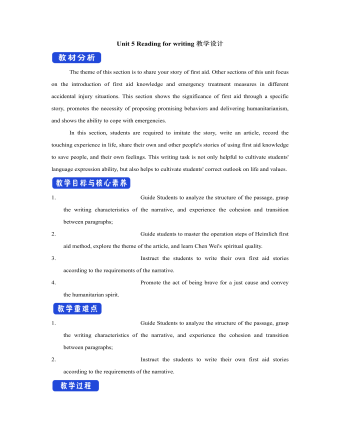
新人教版高中英语选修2Unit 5 Reading for writing教学设计
你校英语报计划出版一期急救常识专刊,现面向全校学生公开征集稿件,你有意参加。请你根据下面提示内容,用英语写一篇短文,介绍在车祸现场对伤者进行急救的方法和步骤。1.确保现场的安全;2.询问伤者,确保其呼吸正常;3.检查伤口,如流血则应采取止血措施;4.如需急救,确保其处于康复位置。注意:1.词数80左右;2.可以适当增加细节,以使行文连贯。参考词汇:康复位置 recovery positionAs we all know, having a knowledge of first aid can make a great difference in our daily life. If a traffic accident happens and someone is injured, the following steps can be used to treat the injured.In the first place, we should make sure that the accident scene is safe so that we won’t get hurt. We should ask the injured person if he is OK, and see if he is breathing. What’s more, we should check for cuts and wounds. If he is bleeding badly, it is vital that we should try to stop the bleeding by applying pressure to the injury. This is because if a person loses too much blood, he may die. If necessary, take the injured person to the hospital as soon as possible.Do remember: when giving first aid, please be sure to place the person in a recovery position.
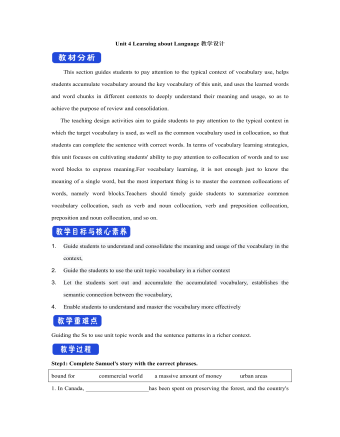
新人教版高中英语选修2Unit 4 Learning about Language教学设计
This section guides students to pay attention to the typical context of vocabulary use, helps students accumulate vocabulary around the key vocabulary of this unit, and uses the learned words and word chunks in different contexts to deeply understand their meaning and usage, so as to achieve the purpose of review and consolidation.The teaching design activities aim to guide students to pay attention to the typical context in which the target vocabulary is used, as well as the common vocabulary used in collocation, so that students can complete the sentence with correct words. In terms of vocabulary learning strategies, this unit focuses on cultivating students' ability to pay attention to collocation of words and to use word blocks to express meaning.For vocabulary learning, it is not enough just to know the meaning of a single word, but the most important thing is to master the common collocations of words, namely word blocks.Teachers should timely guide students to summarize common vocabulary collocation, such as verb and noun collocation, verb and preposition collocation, preposition and noun collocation, and so on.1. Guide students to understand and consolidate the meaning and usage of the vocabulary in the context, 2. Guide the students to use the unit topic vocabulary in a richer context3. Let the students sort out and accumulate the accumulated vocabulary, establishes the semantic connection between the vocabulary,4. Enable students to understand and master the vocabulary more effectivelyGuiding the Ss to use unit topic words and the sentence patterns in a richer context.
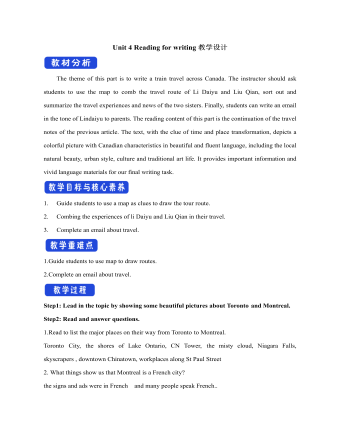
新人教版高中英语选修2Unit 4 Reading for writing教学设计
假定你是英国的Jack,打算来中国旅行,请你给你的中国笔友李华写一封信,要点如下:1.你的旅行计划:北京→泰山→杭州;2.征求建议并询问他是否愿意充当你的导游。注意:1.词数80左右(开头和结尾已给出,不计入总词数);2.可以适当增加细节,以使行文连贯。参考词汇:故宫 the Forbidden City;泰山 Mount TaiDear Li Hua,I'm glad to tell you that 'm going to visit China.First,I am planning to visit Beijing,the capitalof China,where I am looking forward to enjoying the Great Wall,the Forbidden City and somebeautiful parks.Then I intend to go to visit Mount Tai in Shandong Province.I've heard that it is one ofthe most famous mountains in China and I can't wait to enjoy the amazing sunrise there.After that,I amalso going to Hangzhou.It is said that it is a beautiful modern city with breathtaking natural sights,among which the West Lake is a well- known tourist attraction.What do you think of my travel plan? Will you act as my guide? Hope to hear from you soon.
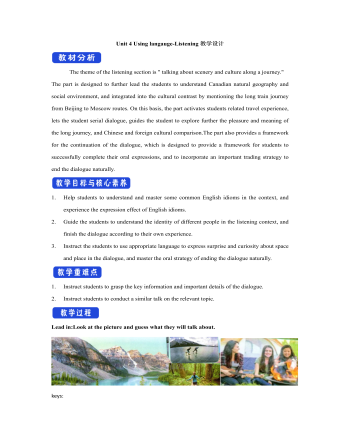
新人教版高中英语选修2Unit 4 Using langauge-Listening教学设计
The theme of the listening section is " talking about scenery and culture along a journey."The part is designed to further lead the students to understand Canadian natural geography and social environment, and integrated into the cultural contrast by mentioning the long train journey from Beijing to Moscow routes. On this basis, the part activates students related travel experience, lets the student serial dialogue, guides the student to explore further the pleasure and meaning of the long journey, and Chinese and foreign cultural comparison.The part also provides a framework for the continuation of the dialogue, which is designed to provide a framework for students to successfully complete their oral expressions, and to incorporate an important trading strategy to end the dialogue naturally.1. Help students to understand and master some common English idioms in the context, and experience the expression effect of English idioms.2. Guide the students to understand the identity of different people in the listening context, and finish the dialogue according to their own experience.3. Instruct the students to use appropriate language to express surprise and curiosity about space and place in the dialogue, and master the oral strategy of ending the dialogue naturally.1. Instruct students to grasp the key information and important details of the dialogue.2. Instruct students to conduct a similar talk on the relevant topic.
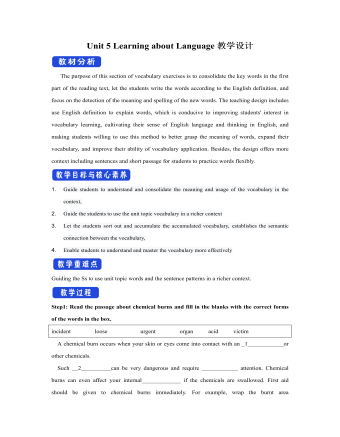
新人教版高中英语选修2Unit 5 Learning about Language教学设计
The purpose of this section of vocabulary exercises is to consolidate the key words in the first part of the reading text, let the students write the words according to the English definition, and focus on the detection of the meaning and spelling of the new words. The teaching design includes use English definition to explain words, which is conducive to improving students' interest in vocabulary learning, cultivating their sense of English language and thinking in English, and making students willing to use this method to better grasp the meaning of words, expand their vocabulary, and improve their ability of vocabulary application. Besides, the design offers more context including sentences and short passage for students to practice words flexibly.1. Guide students to understand and consolidate the meaning and usage of the vocabulary in the context, 2. Guide the students to use the unit topic vocabulary in a richer context3. Let the students sort out and accumulate the accumulated vocabulary, establishes the semantic connection between the vocabulary,4. Enable students to understand and master the vocabulary more effectivelyGuiding the Ss to use unit topic words and the sentence patterns in a richer context.Step1: Read the passage about chemical burns and fill in the blanks with the correct forms of the words in the box.
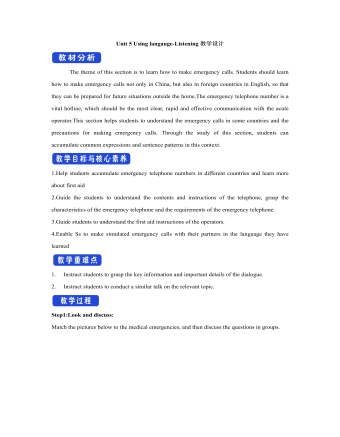
新人教版高中英语选修2Unit 5 Using langauge-Listening教学设计
The theme of this section is to learn how to make emergency calls. Students should learn how to make emergency calls not only in China, but also in foreign countries in English, so that they can be prepared for future situations outside the home.The emergency telephone number is a vital hotline, which should be the most clear, rapid and effective communication with the acute operator.This section helps students to understand the emergency calls in some countries and the precautions for making emergency calls. Through the study of this section, students can accumulate common expressions and sentence patterns in this context. 1.Help students accumulate emergency telephone numbers in different countries and learn more about first aid2.Guide the students to understand the contents and instructions of the telephone, grasp the characteristics of the emergency telephone and the requirements of the emergency telephone.3.Guide students to understand the first aid instructions of the operators.4.Enable Ss to make simulated emergency calls with their partners in the language they have learned1. Instruct students to grasp the key information and important details of the dialogue.2. Instruct students to conduct a similar talk on the relevant topic.Step1:Look and discuss:Match the pictures below to the medical emergencies, and then discuss the questions in groups.
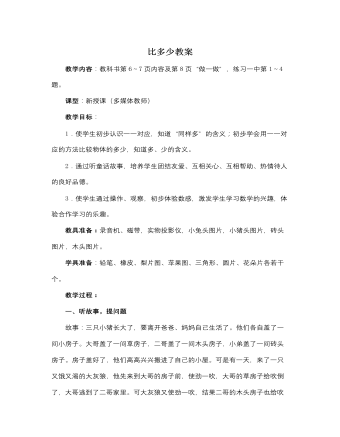
人教版新课标小学数学一年级上册比多少教案
4.操作。(“做一做”第2题) 全班同学动手操作,1名同学到投影仪上操作。 (1)第1行摆5个△,在△下面摆○,△要比○多1个。第2行摆几个○? (2)第1行摆4朵红花,摆的黄花比红花少1朵,第2行摆几朵黄花? 二、运用新知 教科书练习一第1~4题。 1.第1题:左图是猴子多,右图是骨头多。(避免学生产生思维定势) 2.第2题:学生观察,看到公鸡和鸭子虽然摆的一样长,但疏密不同,进而判断摆的密的鸭子的只数多些,而公鸡只数少些。 3.第3题:学生在观察到第一排蛋糕同样多的基础上,只需比较两盒中的第二排。第二排多的就多些,反之,就少些。 4.第4题:此题是在同一排中比较多少,当第5次循环出现珠子时,只出现了一个黄色珠子,所以黄珠子多而红珠子少。 三、总结 教师:今天我们学习了“比一比”,知道在比较时,一定要一个对着一个比,就会得到正确的结果。
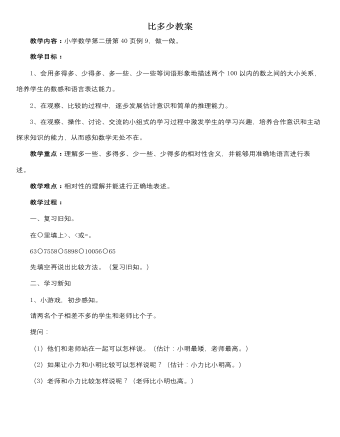
人教版新课标小学数学一年级下册比多少教案
教学目标:1、会用多得多、少得多、多一些、少一些等词语形象地描述两个100以内的数之间的大小关系,培养学生的数感和语言表达能力。2、在观察、比较的过程中,逐步发展估计意识和简单的推理能力。3、在观察、操作、讨论、交流的小组式的学习过程中激发学生的学习兴趣,培养合作意识和主动探求知识的能力,从而感知数学无处不在。教学重点:理解多一些、多得多、少一些、少得多的相对性含义,并能够用准确地语言进行表述。教学难点:相对性的理解并能进行正确地表述。教学过程:一、复习旧知。在O里填上>、<或=。63O7558O5898O10056O65先填空再说出比较方法。(复习旧知。)
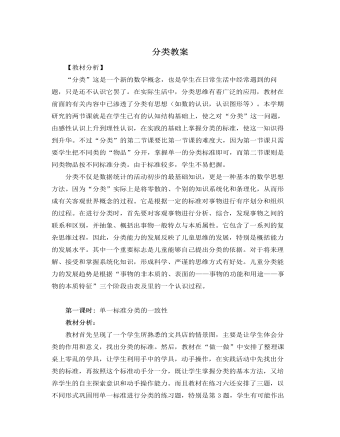
人教版新课标小学数学一年级上册分类教案
教学目标:1.能选择不同的标准对同一类物品进行不同的分类,掌握分类的方法。2.初步感知不同标准分类的意义,体验分类结果在不同标准下的多样性。3.培养学生思维的灵活性和发散性,养成良好的学习、生活习惯。4.培养学生的操作能力、观察能力、判断能力、语言表达能力和合作交流的意识。5.让学生体会到生活中处处有数学,学会用学到的知识解决生活中的实际问题。教学重、难点:重点:选择不同标准分类难点:思维的发散性 关键:在直观中拓展思维的时空教学准备:铅笔、实物卡片、学具袋(各种形状、颜色各异的物品)教学过程:一、观察分析 多重分类1.师出示如书本P39页的铅笔。(1)观察这些铅笔有什么不同?并把它们分分类。(2)四人一小组交流、讨论可以怎么分类?是按什么分的?比比哪一组的分法最多。
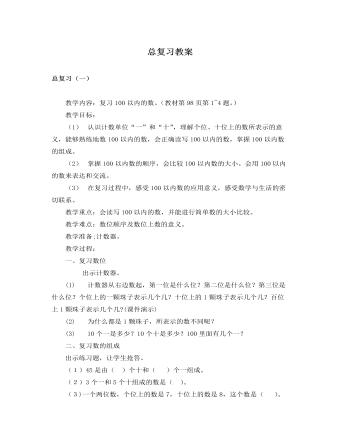
人教版新课标小学数学一年级下册总复习教案
教学内容:复习100以内的数。(教材第98页第1~4题。)教学目标:(1) 认识计数单位“一”和“十”,理解个位、十位上的数所表示的意义,能够熟练地数100以内的数,会正确读写100以内的数,掌握100以内数的组成。(2) 掌握100以内数的顺序,会比较100以内数的大小。会用100以内的数来表达和交流。(3) 在复习过程中,感受100以内数的应用意义,感受数学与生活的密切联系。教学重点:会读写100以内的数,并能进行简单数的大小比较。教学难点:数位顺序及数位上数的意义。教学准备;计数器。教学过程:一、复习数位出示计数器。(1) 计数器从右边数起,第一位是什么位?第二位是什么位?第三位是什么位?个位上的一颗珠子表示几个几?十位上的1颗珠子表示几个几?百位上1颗珠子表示几个几?(课件演示)(2) 为什么都是1颗珠子,所表示的数不同呢?(3) 10个一是多少?10个十是多少?100里面有几个一?
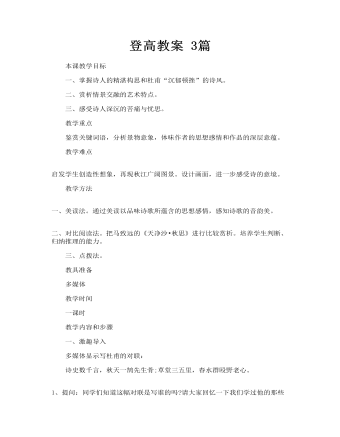
登高教案 3篇
一、激趣导入 多媒体显示写杜甫的对联: 诗史数千言,秋天一鹄先生骨;草堂三五里,春水群殴野老心。 1、提问:同学们知道这幅对联是写谁的吗?请大家回忆一下我们学过他的那些作品?能背诵一首我们共同欣赏吗?(学生背诵)今天我们来学习他的另一首诗歌《登高》(板书)
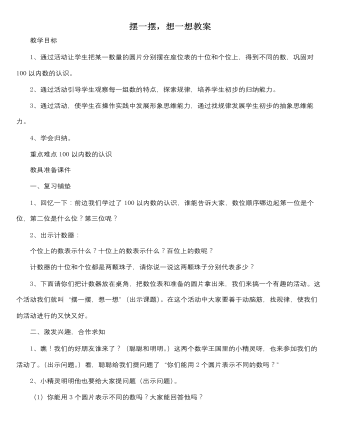
人教版新课标小学数学一年级下册摆一摆,想一想教案
每组4名小朋友3名在数位板上摆圆片,1名小朋友对摆出的结果进行综合、记录。3、全班一起用2个圆片摆出不同的数,引导学生讨论一下问题:(1)为什么两个圆片摆在个位上得到的数十2,而摆在十位上得到的数十20?(2)记录摆出的数是需要注意什么?(3)怎样才能知道摆出的数不遗漏?4、从刚才小朋友们用圆片摆数的过程,你发现有没有规律?下面我们不摆圆片,能不能在脑子里想摆圆片的方法,直接写出6个圆片,7个圆片,8个圆片,9个圆片都能表示哪些数?好,四个人合作,看哪一组填写的又快又好!学生分组活动:分别用3、4、5、6、7、8、9个圆片摆出不同的数。5、从以上我们所摆的圆片个数和写出来的数来看,同学们观察到有什么规律了吗?谁能说一说。
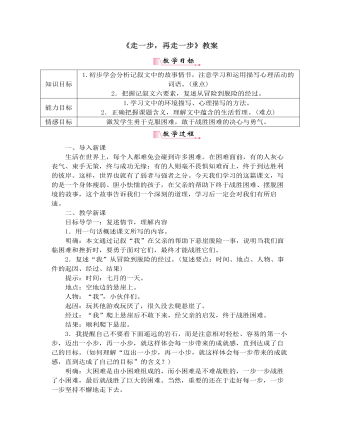
部编版语文七年级上册《走一步再走一步》教案
【教学提示】题目的设计意图是要培养同学们患难与共的爱心,克服困难的勇气和决心。目标导学二:分析环境和心理描写1.文章开头为什么突出“酷热”?明确:开头一自然段主要写孩子们为什么想到去爬悬崖。写天气的酷热,通过环境描写,突出了人物的心理,即酷热使人烦躁,小伙伴就厌倦了正在玩的游戏,从而想到很久没有爬悬崖。2.“时间在慢慢地过去。影子在慢慢拉长,太阳已经没在西边低矮的树梢下,夜幕开始降临。”“暮色中,第一颗星星出现在天空中,悬崖下面的地面开始变得模糊。”这两句话是什么描写?请简要分析其作用。明确:这是典型的环境描写,很好地烘托了“我”的恐惧心理。3.当“我”被弃于悬崖时,“我”的心理状态是怎样的?请从文中找出描写“我”处于险境中的心理状态的词句。明确:“我”的心理状态是恐惧。词语:阵阵晕眩、天旋地转、神情恍惚。句子:“我听见有人在哭泣、呻吟;我想知道那是谁,最后才意识到那就是我。”“我趴在岩石上,神情恍惚,害怕和疲劳已经让我麻木。”
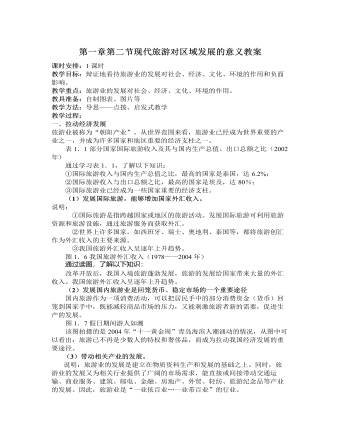
人教版高中地理选修3第一章第二节现代旅游对区域发展的意义教案
三、影响区域环境说明:环境是旅游业的基础,旅游对环境保护具有促进作用。世界上很多国家在发展旅游业的同时,都很重视对旅游资源和环境的保护,以实现旅游业的可持续发展。旅游业的发展对环境也有消极作用,如果旅游与环境的关系不处理好,环境也会朝着恶化的方向发展。图1.10古建修复图1.10对比显示古建筑修复前后景观的变化,说明旅游业的发展有利于文物古迹和古建筑的保护。讨论:1.列举旅游业发展有利于环境的措施。提示:建立各种自然保护区、申报历史文物保护单位等措施都有利于保护旅游环境。2.举例说明旅游对环境的消极作用。提示:旅游对环境的消极作用主要表现在:由于对旅游资源开发建设不当或失误,使生态环境恶化;由于大量游客的涌入,排放的各类废弃物超过了环境自净能力而造成环境污染;由于大量游客的接触或不文明行为引起的对风景、文物的破坏等。

新人教版高中英语选修2Unit 3 Food and Culture-Discovering useful structures教学设计
The newspaper reported more than 100 people had been killed in the thunderstorm.报纸报道说有一百多人在暴风雨中丧生。(2)before、when、by the time、until、after、once等引导的时间状语从句的谓语是一般过去时,以及by、before后面接过去的时间时,主句动作发生在从句的动作或过去的时间之前且表示被动时,要用过去完成时的被动语态。By the time my brother was 10, he had been sent to Italy.我弟弟10岁前就已经被送到意大利了。Tons of rice had been produced by the end of last month. 到上月底已生产了好几吨大米。(3) It was the first/second/last ... time that ...句中that引导的定语从句中,主语与谓语构成被动关系时,要用过去完成时的被动语态。It was the first time that I had seen the night fact to face in one and a half years. 这是我一年半以来第一次亲眼目睹夜晚的景色。(4)在虚拟语气中,条件句表示与过去事实相反,且主语与谓语构成被动关系时,要用过去完成时的被动语态。If I had been instructed by him earlier, I would have finished the task.如果我早一点得到他的指示,我早就完成这项任务了。If I had hurried, I wouldn't have missed the train.如果我快点的话,我就不会误了火车。If you had been at the party, you would have met him. 如果你去了晚会,你就会见到他的。
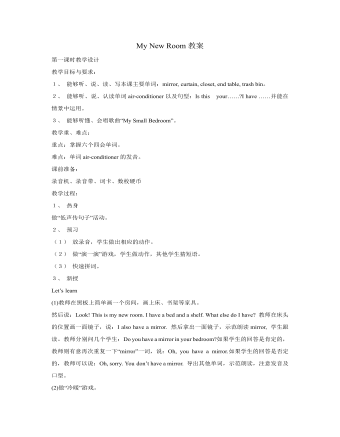
人教版新课标PEP小学英语五年级上册My New Room教案
Let’s learn(1)教师在黑板上简单画一个房间,画上床、书架等家具。然后说:Look! This is my new room. I have a bed and a shelf. What else do I have? 教师在床头的位置画一面镜子,说:I also have a mirror. 然后拿出一面镜子,示范朗读mirror, 学生跟读。教师分别问几个学生:Do you have a mirror in your bedroom?如果学生的回答是肯定的,教师则有意再次重复一下“mirror”一词,说:Oh, you have a mirror.如果学生的回答是否定的,教师可以说:Oh, sorry. You don’t have a mirror. 导出其他单词,示范朗读,注意发音及口型。(2)做“冷暖”游戏。(3)教师在黑板上示范书写单词:mirror, curtain, closet, end table, trash bin,让学生在词卡反面或练习本上拼写、记忆单词。(4)播放本课录音,让学生在书上手指相应单词并跟读。巩固延伸:做句型接龙游戏;做“找同伴”活动;学唱歌曲;完成配套练习;练习书写单词第二课时教学设计教学目标与要求:1、 能够听懂、会说本课对话,并能做替换练习。2、 能够听、说、认读句型There is a ……/There are …并能在情景中正确运用。3、 了解Good to know内容。
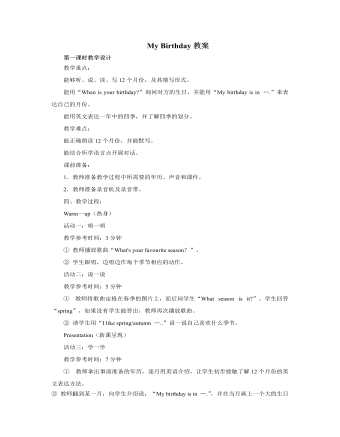
人教版新课标PEP小学英语五年级下册My Birthday教案
① 教师询问学生“What day is today?”,学生说出“Today is …”。而后又问学生:“What’s the date?”,帮助学生说出今天的具体日期:“It’s …”。 ② 让学生拿出课前准备的年历(最好是学生自己制作的),教师随意指着某天询问学生:“What’s the date?”,而后请学生拿着年历相互用“What’s the date? It’s ….”进行问答练习。③ 教师拿着年历从一月开始问学生:“Who has a birthday in January? Please stand up.”,而后教师问起立的学生:“What’s the date?”,让一月份生日的学生答出具体日期。④ 请若干名学生代替老师进行提问,从二月到十二月。活动四:Let’s talk教学参考时间:8分钟① 教师播放对话录音两遍,而后提问:“When is Sarah’s birthday? When is Zhang’s birthday?”,学生根据对话内容回答出:“Sarah’s birthday is in October1st. Zhang’s birthday’s is in March12th.”。 ② 学生跟读对话,两人一组做对话练习。 ③ 学生根据同学的生日组织一个新的对话,教师请若干组展示他们的对话。
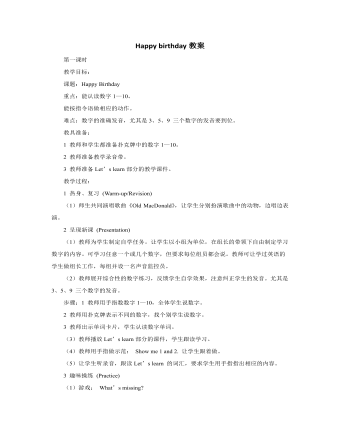
人教版新课标PEP小学英语三年级上册Happy birthday教案
(2)猜猜看每次请一个同学在黑板上画一种刚学到的物品,他每画一笔,就请班上的同学用英语猜他画的是什么。如猜得正确,就请下一位同学再重新开始画另一种物品。(3)Let’s rhyme.将所学的单词替换第一单元的Let’s chant中的文具。教师将全班分为两大组,教师举图片提示,如第一组说:I have a balloon.第二组一起说:Me too. 拍手,举第二幅图时两组交换。以此类推。(4)教师将单词的图片先面朝上贴在黑板上,给学生20秒时间记住这些单词,然后每张图卡用1张彩色纸盖上。学生要先说出彩色纸的颜色,再说出下面卡上的词。待学生熟悉后,可加大游戏难度,将盖着彩色纸的图卡在(黑板上)打乱,进行游戏。(5)让学生听录音,边说边做Let’s do部分的活动。(6)教师将Let’s do中的图卡打乱顺序,贴在黑板上,教师说一个指令,请学生指出正确的图片。正确的可为本组赢一分。
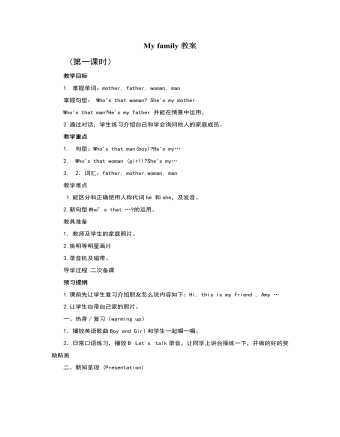
人教版新课标PEP小学英语三年级下册My family教案
1.能够听、说、读、写字母H h, Ii,并能听说认读以这些字母为首字母的单词:hamburger, hot dog ,ice-cream, ice.2.听懂Let’s do 中的字母和短语,并做出相应的动作。如:A B C, look and see.3.听懂Story time 的内容。教学重点 掌握字母H h, I i单词:hamburger, hot dog ,ice-cream, ice。教学难点 1.能够听懂一些指令性短语,并做出相应的动作。2. Story time 的内容教具准备 1.本课时相关的单词卡和图片2. 教材相配套的教学录音带导学过程 二次备课预习提纲1. 课前了解一些食物英语的名称。2. 课前先让学生复习三年级上册FoodPart A Let’s Learn 部分的单词:cake ,bread, chicken…一.热身/复习(warming up)1. 游戏:找朋友将学过的七个字母按大小写分开,一部分学生拿大写字母卡,一部分拿小写字母卡。让拿大写字母卡的学生分别起立读出手中的字母,那对应小写字母卡的学生跟到他前方举起手中的字母,说:I’m… 两人握手2.让学生听三年级上册Part A Let’s Learn部分的录音,了解相关的食物的名称。.
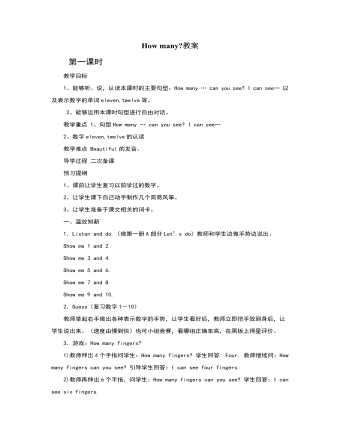
人教版新课标PEP小学英语三年级下册How many教案
一.温故知新1.教师播放“One, two, three, four, five”歌曲的录音带,让学生跟随录音一起唱。2.复习数字1-151)报数:教师让学生从1-15按顺序用英文报数,如果前一个学生报到15了,那么下一个学生就要从1再开始。2)游戏:叫号。教师把写有one —fifteen的单词卡发给学生,教师随意说数字,谁拿着相应的单词卡,谁就站起来并大声读出该单词。3.操练句型How many … can you see? I can see…和How many… do you have? I have…(使用15以内的数字)二.新课呈现 1.教师将1-15的数字卡贴在黑板上,用其中的两张组成一个算式,在两张数字卡的中间写上“+”号,其和为15以内,让学生去计算,如Ten and five is fifteen.2.让学生两人一组,一个学生摆算式,另一个学生用英文说出结果。3.教师出示算式卡,如Nine and seven,让学生快速说出两数之和,并请最先说出答案的学生将算式用数字形式写在黑板上,在单词卡中找到相应的单词贴在和的位置上。

